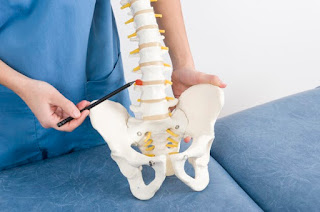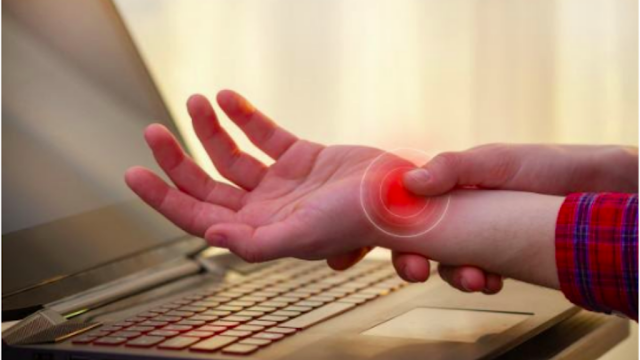All you need to know about Herniated Disc
Back pain can creep up on you once you least expect it. One minute you're sitting comfortably ahead of the TV, and the next you are trying to stand up, and -- ouch! -- a pointy pain radiates through your lower back.
Could you've got a slipped or herniated disc? you would possibly.
The adult spine is formed from 24 bones called vertebrae. a number of the vertebrae are cushioned by soft discs made from a jelly-like substance. These discs allow you to maneuver your spine around and bend over. But if a disc between two vertebrae starts slipping out of place, it can irritate the encompassing nerves and cause extreme pain. The condition is named a slipped, ruptured, or herniated disc.
A ruptured intervertebral disc can continue the nerves in your spine and cause pain, weakness, and numbness in your neck, back, arms, and legs. Sometimes these symptoms are often severe enough to disrupt your life. Most of the time, though, the issues from your ruptured intervertebral disc should start to enhance on their own within a couple of weeks.
Signs of a Herniated disc:
One sign could also be where the pain is. Although herniated discs can happen in any part of your spine, they're commonest within the lower part of your backbone (the lumbar spine), just above your hips. The pain may spread from your back to your buttocks, thighs, and even to your calves.
Discomfort from a herniated disc usually gets worse when you're being active and lessens when you're resting. Even coughing, sneezing, and sitting can worsen your symptoms because they put pressure on pinched nerves. A herniated disc can also offer you a sense of tingling or numbness. The affected part of your back can also feel weak.
Age also plays a role. As you get older, your discs tend to break down and lose their cushioning. That makes a herniated disc more likely.
Making Lifestyle Changes If You Have Herniated Disc:
A few smart lifestyle changes can help keep your low back healthy and fully functioning such as:
Move objects smartly: Poor mechanics when lifting or moving heavy objects can cause injury to your back, like muscle strains. When you pick up a heavy box, for example, you should lift with your legs — not your back. Squat down to pick up the item rather than hinging forward from your waist.
Reform your unhealthy habits: Smoking can increase your risk of lower back pain. It reduces the flow of oxygen-rich blood to the bones and soft tissue of the area. This denial of nutrients causes degeneration and subsequent back pain.
Quit smoking or, better yet, never start to begin with. Reach out to professionals if you need help kicking the habit.
Drinking too much alcohol raises your levels of inflammation, which also contributes to pain. You don’t have to pass up the drinks altogether, just moderate your intake.
Keep an eye on the scale: Your goal isn’t to become supermodel skinny; it’s to keep your weight in a healthy range, so you aren’t putting extra stress on your back.
Make it a habit to eat healthily and keep your portions in check. Plus, get up and move regularly during the day. It helps you burn calories to maintain your weight and encourages mobility in your spine.
Posture perfect: Avoid slumping and slouching, especially over your computer if you have a desk job. Stand regularly to stretch your legs, hips, and back. When you sit, make sure the chair allows your knees to be about hip height, the computer monitor at eye level, and the desktop just above your waist.
Herniated Disc Diagnosis and Treatment:
The best way to telling if you've got a herniated disc is to consult your doctor. They’ll likely do a physical exam to seek out the source of your pain. This usually is that the only test you’ll got to confirm a diagnosis. Your doctor will check your back for sore or painful spots. they'll ask you to lie on your back and lift or move your legs in certain ways. If you are feeling pain, it’s likely a herniated disc.
If your doctor wants to rule out other sources of your pain or pinpoint specific nerves that are aggravated, they may do further testing, including X-rays, CT scans, MRIs, Myelogram, Electromyogram (EMGs), Nerve conduction studies (NCS).
In the meantime, try one or more of the following treatments to assist you to feel better.
Rest: Take it easy for a few days. Rest can relieve swelling and give your back time to heal. While your back hurts, avoid exercise and other activities where you have to bend or lift.
Medications: Take an over-the-counter pain medicine like ibuprofen or naproxen. These medicines can help relieve your pain and bring down swelling.
Physical Therapy: Some exercises can help improve the symptoms of a herniated disc. A physical therapist can teach you which ones strengthen the muscles that support your back.
Most herniated discs recover on their own or with treatment. But they will happen again. To protect your spine and stop another herniated disc, you ought to always sit and get up straight. If you've got to stand for an extended period of your time, rest one foot on a stool or box to remove pressure off your back. Stay at an honest weight for you. Extra pounds put more strain on your back. Following a healthy lifestyle can help recover from a herniated disc or, even better, avoid it altogether.



Comments
Post a Comment